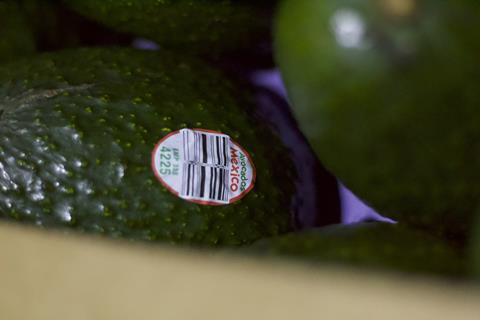With the Super Bowl just days away, what impact with Trump’s tariffs have on demand for avocados and other Mexican fruit and vegetables?
Trump’s 25 per cent tariff on Mexican imports, announced on Saturday, will affect around US$475bn in exports from the country, equivalent to 80 per cent of Mexico’s foreign trade, according to estimates by the National Agricultural Council (CNA).

Fruits and vegetables are amongst the worst hit products, especially avocados, tomatoes, chillis and berries. Last year, the US imported US$10.8bn of fruit and US$9.6bn of vegetables from Mexico, of which US$3.1bn was avocados.
Mexico supplies more than of 90 per cent of the avocados bought in the US and the tariffs come just days before the 9 February Super Bowl, by far the biggest day for consumption.
According to data from NielsenIQ, prices are already up 14 per cent from a year ago due to the drought in Mexico curbing production and reducing average sizes, meaning there are fewer of the large avocados that Americans prefer.
In the first four weeks of 2025, avocado shipments into the US fell 26 per cent compared to the same period in 2024, according to Rabobank.
Álvaro Luque, CEO of Avocados From Mexico (AFM), the US marketing arm of Mexico’s avocado industry, is confident that demand would hold up despite the price increases. “[US consumers] are willing to pay a premium. People are really in love with this fruit,” he told Bloomberg.
Such is the strength of US demand that there are limited options for replacing Mexican avocados with fruit from other supply sources – at least in the short term. Colombia is one option, although registering farms and packhouses for export to the US is a slow process.
Peru could also divert shipments from Europe to the US, according to Gabriel Amaro, head of Agap, the Peruvian agricultural guild. “We hope the Mexicans overcome this impasse, but in the meantime Peru could supply the US market,” Amaro told Bloomberg. “It is very likely that this would be an opportunity.”
However, in the long term it remains to see if this is a viable option. US reliance on Mexico increases during the winter months, when it sources 95 per cent of its avocados from Mexico, AFM said.
Will Cavan, executive director of the International Pineapple Organisation and International Mango Organisation, said the tariffs will have implications for the entire region.
“You can’t generalise that the tariff will only affect Mexico and Canada … think of this as an opportunity for new suppliers to step in and fill a need,” he said, adding that “perhaps Mexico will reflect upon the strategic position they have right next door to a market literally hours from the farm … perhaps Mexico farming will rethink the role of drug cartels in the supply chain and realise what it truly means to be a good neighbour”.



